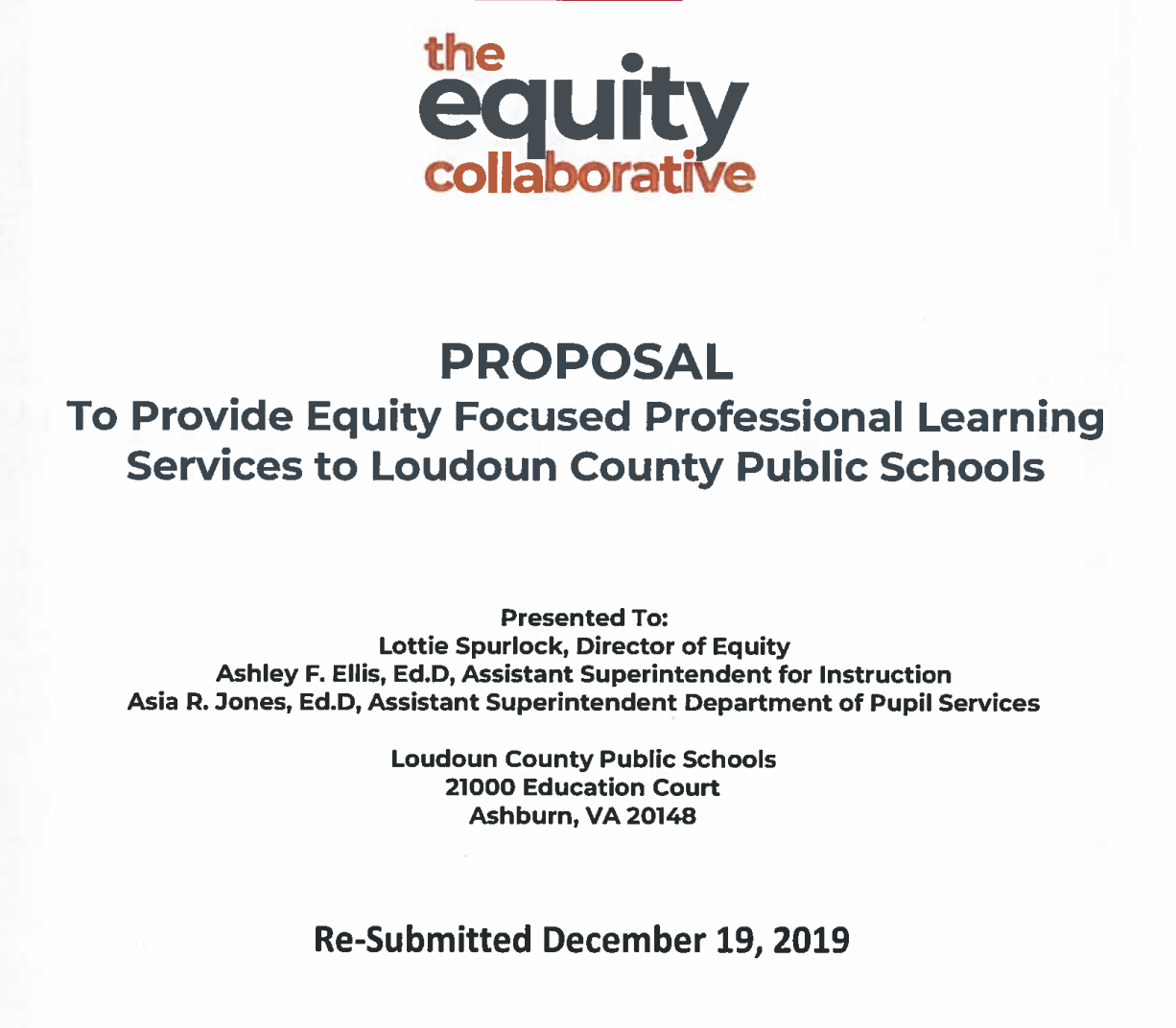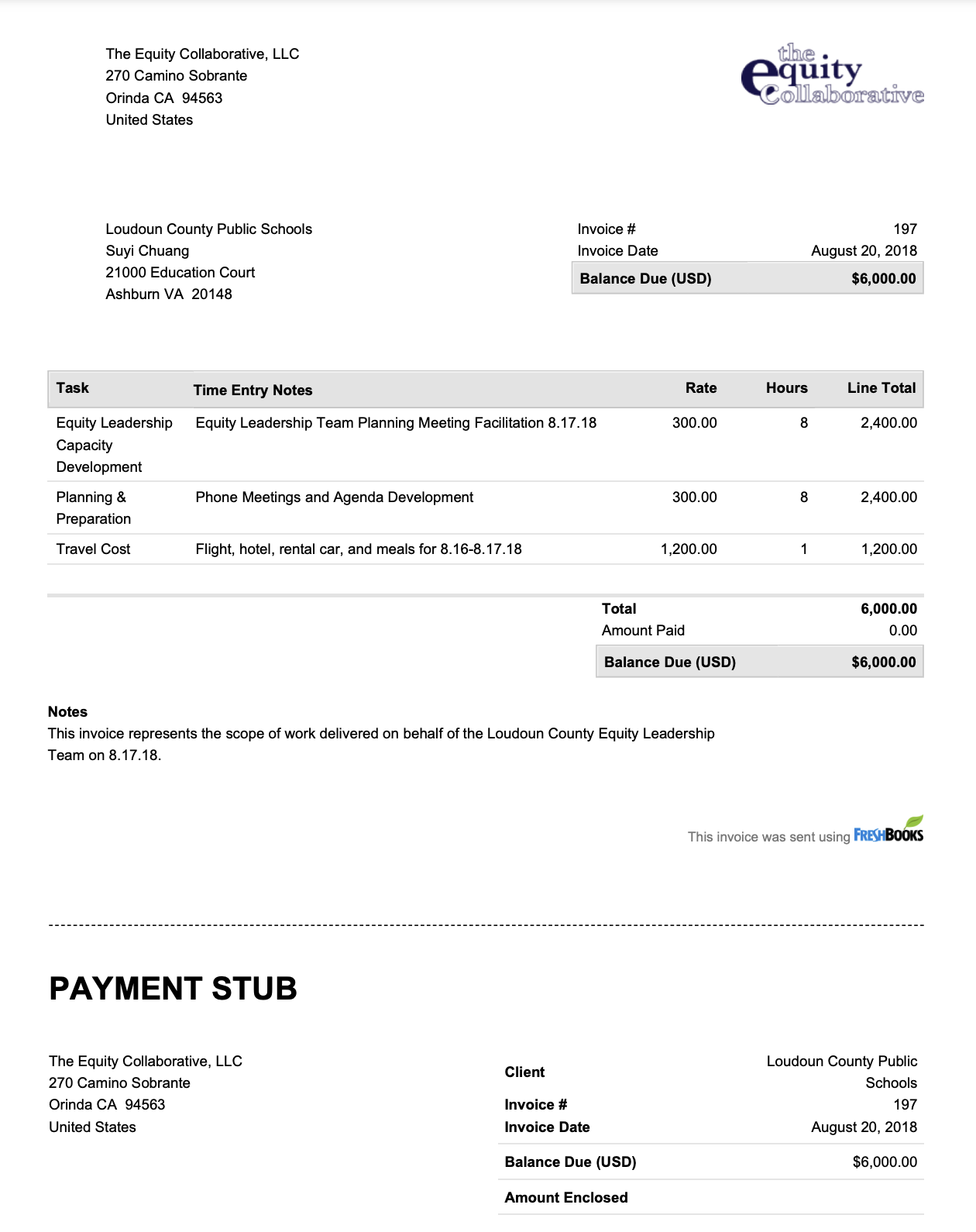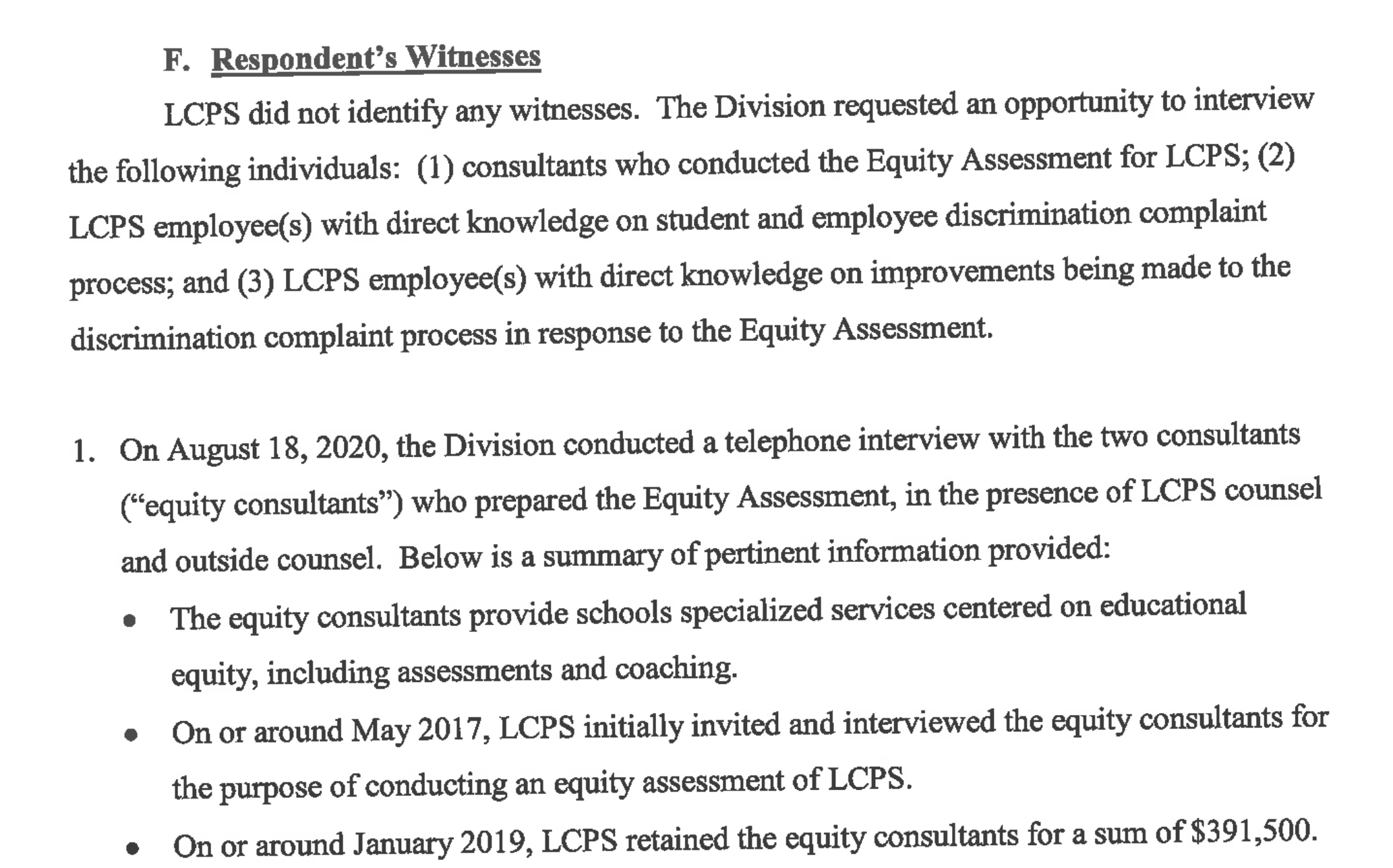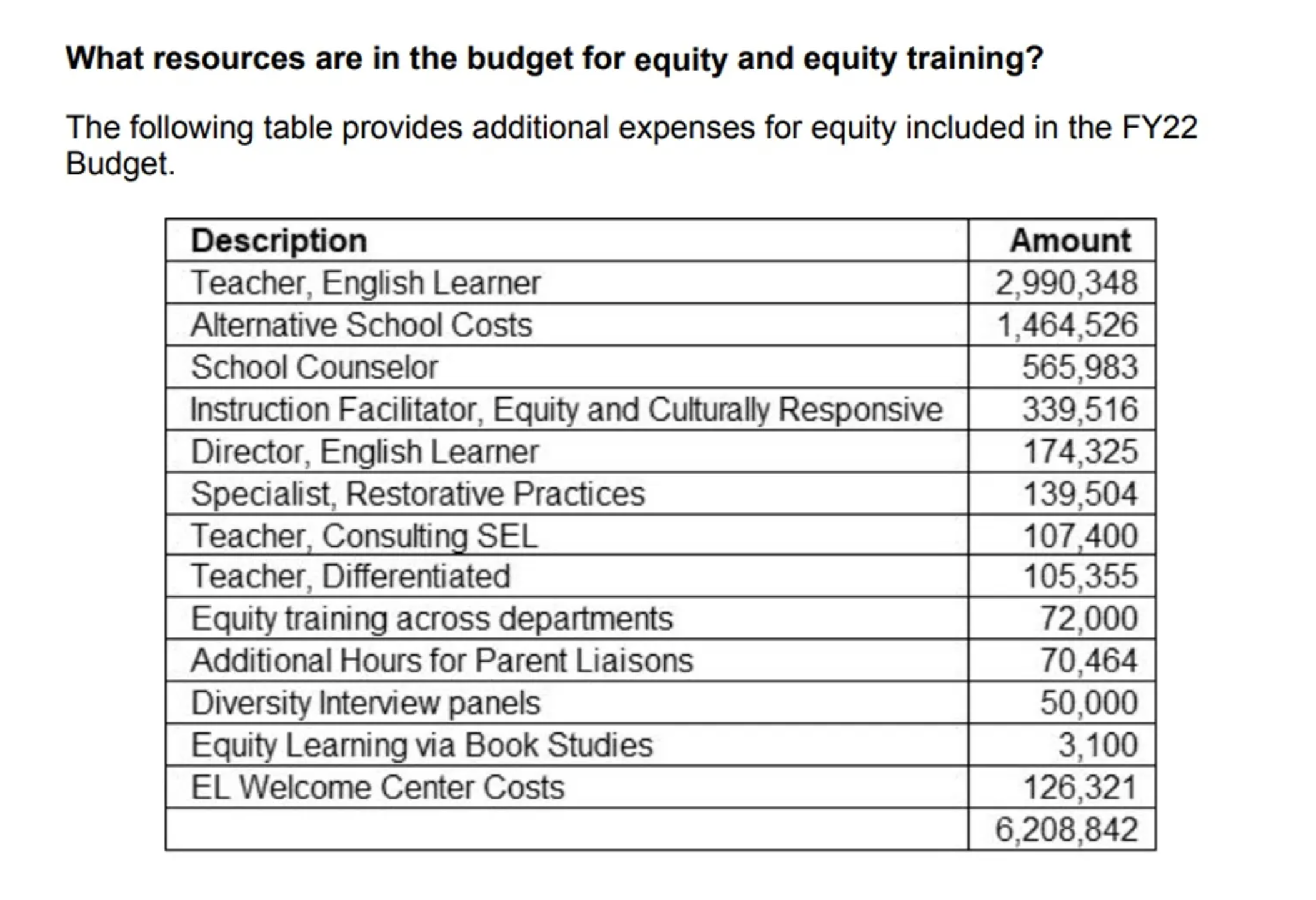The documents at the heart of a nationwide controversy.

BY: Matt Taibi, Independent Investigative Journalist
PUBLISHED: December 17, 2021
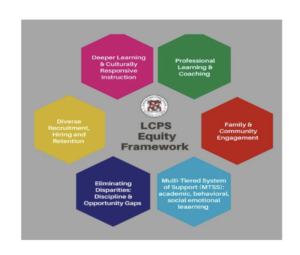
Loudoun County paid at least $500,000 to be twice delivered suggestions about “social emotional learning.”
In preparation for today’s forthcoming story, A Culture War in Four Acts: Loudoun County, Virginia. Part Two: ‘The Incident,’ TK News sent Freedom of Information requests to the county on several questions. Concerned with the issue of when the controversial “Equity Collaborative” was hired, we asked for “procurement or purchasing process documents, stakeholder emails and communique leading to the hiring of ‘The Equity Collaborative’ as consultant or business partner for any role by Loudoun County School District/County.” We’ve enclosed documents we received in response here.
A lot of these had already been made public in stories like this one from the Washington Free Beacon, but there is some new information, and what we did get raised some new questions. There’s still no record of how the Collaborative came to win the original Equity Assessment contract, and the chronology in which the firm submitted a formal bid for further work only after it had already won a no-bid, $500,000 contract remains, to say the least, confusing. A number of documents are listed as having been re-submitted, and it’s not easy to sort out when the originals were produced.
Included here is the firm’s original “Equity Assessment,” its “Action Plan to Combat Systemic Racism,” a “Comprehensive Equity Plan,” and pay stubs for several additional rounds of equity coaching.
A great deal of vitriol has been spent in Loudoun litigating the question of whether the arrival of the “Equity Collaborative” was triggered by the “runaway slave game” incident (see today’s forthcoming story) or whether there was a pre-existing relationship with the soon-to-be-infamous consultancy. The county insists the assessment was already in the works, and records do reveal that as far back as the previous summer, on August 20, 2018, the county spent $6000 on an “Equity Leadership Team Planning Meeting Facilitation” with the Collaborative, indicating an existing relationship.
Moreover, in a later Attorney General’s report, employees for the Equity Collaborative told state investigators that “on or around January, 2019” – before the “slave game,” in other words – “LCPS retained the consultants for $391,500.”
However, the documents just don’t back that version of events up. After the small invoice from August 2018, the contract record the county schools produced is blank until over six months later, well after the “slave game” fiasco. The next document in the queue, from April 4, 2019, includes a sizable, already-completed scope of work agreement. As described in the other piece, the county signed a deal to spend an initial $242,000 on a wide-ranging “equity assessment” to be performed by the Collaborative. The firm was contracted to “provide insights into biases in working relationships, institutional policies, and practices.”
The paper outlined the hiring of three consultants to spend eight days, at a rate of $5,000 per day per consultant, to conduct the “assessment” of Loudoun schools. That’s $120,000 off the top, with another $32,000 going to EC executives Jamie Almanzan and Graig Meyer to write a “District Equity Plan.” Another $40,000 was initially budgeted to Almanzan for providing “Equity Driven Central Office Leadership” to the county for 2 days per month, across four months, at a rate of $10,000 per month. None of these expenditures was cleared with the School Board, which according to multiple sources would normally have input on much smaller budgetary matters.
Within a few months after the “Assessment” was done, Almanzan would submit a report that drove a fair portion of the county out of its gourd. More details later, but in short, the Equity Collaborative found so much systemic racism, combined with such deplorably “low levels of racial literacy” among the local staff, that only massive amounts of outside training could hope to civilize the place.
The report’s most powerful material involved the anecdotal revelations of students, who described racially charged incidents:
A group of White kids [at my school] used the N-word and then denied it.
A kid who said something dumb – said it was OK because he had “the N-pass.”
The N-word gets used ALL the time here. Kids are always getting on me about my skin color and my hair.
I’ve had racist remarks made to me by another kid’s parents. I don’t take it as a joke, I take it personally. No – that’s not OK. I don’t like it from anyone.
Most everyone I spoke to about this Assessment, including some of its harshest critics, agreed that this part about the “pervasive use of racial slurs and insults” rang true. The county schools have a long history of racist or racially charged incidents. Some said they believed one of the reasons the school system hired the Collaborative in the first place had to do with the fact that parents had complained about these matters for years, and sufficient action hadn’t been taken.
However, the Equity Collaborative report, based on interviews conducted by three consultants at the aforementioned $5000-per-day rate for what would eventually turn out to be 11 days (they were billed for that, at least), was also curiously light on both context and quantitative analysis, and in places made troubling omissions. For instance, Asian students were left out of the section about academic “achievement disparities” (actually there were no stories at all referencing the experiences of the county’s second-largest demographic). In other places, like for instance in the passage about “the rapid pace at which the non-White populations are growing and the anxiety that produces,” the report seemed to be referencing the influx of South Asian immigrants without delineating which nonwhite groups were causing the “anxiety.”
Some of the anecdotes also raised questions. Were reports like the following investigated?
In middle school and there was something in a book about Arabs and the teacher said – All Arabs are terrorists. I raised my hand and said “I am Arab and I am not a terrorist.” She just stared at me.
The inclusion of other stories just seemed bizarre, like this tale about a teacher saying the word “police” in front of a Hispanic student:
The other day we had a teacher mention police – not in a mean way – to a student. Hispanic kids are dealing with immigration and deportation and for that girl, hearing “the police” means a lot to her.
Ultimately, the report concluded that the county needed to respond with “action — not just good intentions.” Included among the Collaborative’s later Comprehensive Equity Plan were entries like, “By October 2020, 100% of new teachers will engage in on-boarding training sessions on equity, history of racism; mitigating bias, and the need for creating a safe, inclusive, and affirming learning space for every student.”
Who could provide such services? The Equity Collaborative had its hand raised.
In September of 2019 — in other words, a full year after the company originally began working for the county — the Equity Collaborative finally submitted a formal bid for public services. There is no record of other bidders. The submission included a statement of qualifications and a proposed plan of operation. It listed the work it had just done for Loudoun County on its vendor data-sheet as part of its qualifications, putting down Loudoun’s own Director of Equity as a reference.
This was the first step toward Loudoun agreeing to allocate hundreds of thousands more on equity training for the Fiscal Year 2022. And what training! The documents collectively read like a Swiftian satire about an island culture whose citizens speak entirely in gibberish terms like “intentionality,” “feedback loop structures,” and “onboarding action steps,” but are dying out because they’ve forgotten all the words they once used to find mates (“primary stakeholders”). It’s unfortunately all too real to be genuinely funny, but these reports are a literary spectacle nonetheless.
Although a Fox News headline reported the FY 2022 budget for equity work at $6 million, this seems to have been based on a perhaps-too-literal reading of a Board of Supervisors questionnaire. When the Board asked, “What resources are in the budget for equity and equity training?” the county responded with a series of line items that did indeed add up to over $6 million:
However, sources both inside and outside the school system insist the bulk of that money was for normal teaching and support services mainly geared toward the county’s Spanish-speaking minority. There were still sizable allocations for items like “Instruction Facilitator, Equity and Culturally Responsive” ($339,516), “Equity Training Across Departments” ($72,000), and “Diversity Interview Panels” ($50,000), among other things, but there are mixed reports on what the rest of those line items mean.
More TK, as we say around here. Part 2 of the Loudoun series will be out momentarily. In the meantime, here are the EC docs:
Final Equity Collective Files Bundled12.3 MB ⋅ PDF (Download) |


